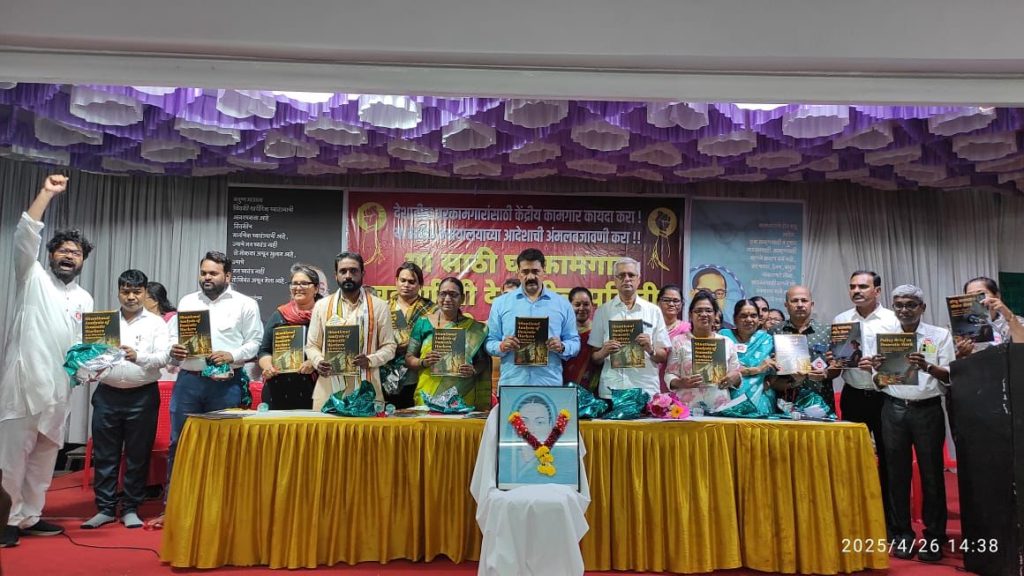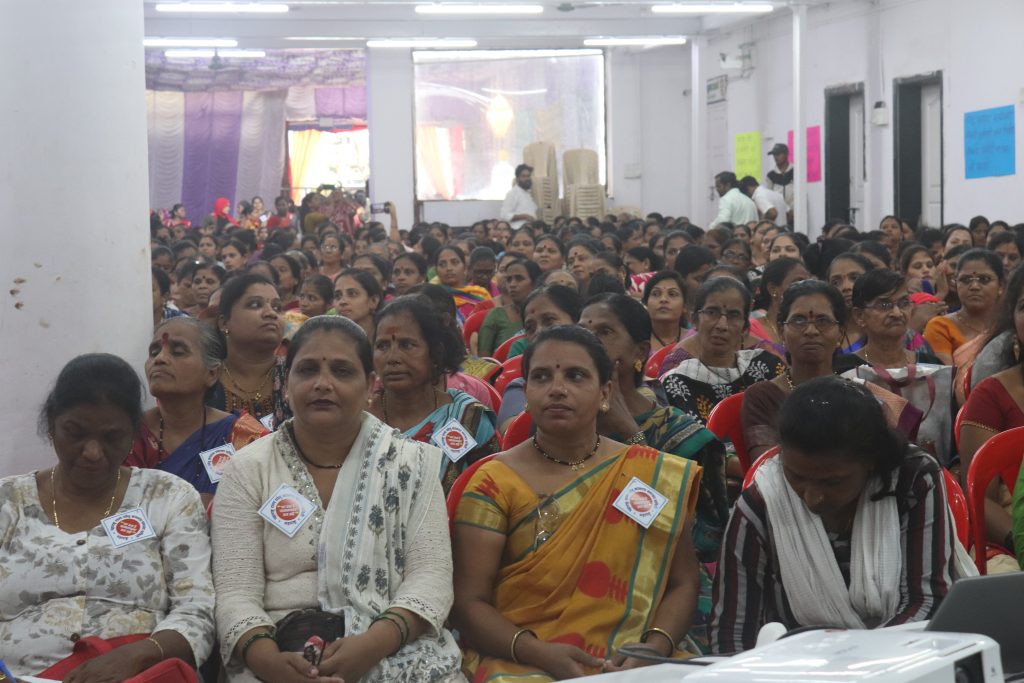On 26 April 2025, over 2,000 women domestic workers, union representatives, and civil society members came together at Dr Babasaheb Ambedkar Bhavan, Dadar, Mumbai, for a state-level parishad (convention). Organised by the Maharashtra Rajya Gharelu Kamgar Samanvay Samiti (MRGKSS), in collaboration with Youth for Unity and Voluntary Action (YUVA), the gathering served as a powerful platform to amplify long-standing demands for the legal recognition, dignity, and social protection of domestic workers in Maharashtra.
MRGKSS is a collective of domestic worker unions and support organisations working across the state. They bring together voices from different parts of Maharashtra to fight for better rights, fair pay, and a life of dignity for domestic workers.
The event also marked the release of a significant report, A Situational Analysis of Domestic Workers in 15 Districts of Maharashtra, which focuses on the conditions faced by domestic workers across the state and an associated policy brief based on the study findings. The launch at the state-level Parishad represents a crucial step in the broader movement for domestic workers’ rights.
This convention took place shortly after a landmark Supreme Court directive on 29 January 2025, which called on the Union Government to seriously consider introducing a comprehensive law to protect domestic workers. The Court noted that domestic workers are mostly excluded from existing labour laws and asked the Ministry of Labour and Employment and other departments to explore the possibility of new legislation.

Insights from the Report:
The situational analysis is based on a detailed survey of 5,019 domestic workers across 15 districts of Maharashtra.
The findings include:
Despite playing a critical role in urban economies, domestic workers remain excluded from legal and welfare protections. Most respondents were women and had been engaged in domestic work for 20–30 years, beginning in early adulthood and continuing until their late 50s. The majority (83 per cent) worked part-time across multiple households, while 16 per cent worked full-day shifts without residing in the employer’s home. Opportunities for skill development and mobility were less.
Educational levels among respondents were low, one-third had never attended school and 45 per cent had only completed primary education. Many domestic workers surveyed were single women (widowed, divorced or abandoned), and 40 per cent were the sole earners for their families. Worryingly, 20 per cent of their school-age children had either dropped out or never enrolled in school.
The Maharashtra Domestic Workers’ Welfare Board (MDWWB) was set up to support domestic workers by offering benefits like health insurance, pensions, and financial aid. Between 2011 and 2023, more than 5 lakh workers had registered with the Board. However, active participation has declined, with only 14,143 new or renewed registrations recorded in 2022–23. Nearly 70 per cent of workers surveyed were unregistered with the Board, and 57 per cent had never applied, primarily due to lack of awareness, complex registration processes, and the perception that registration yields little benefit. Among those registered, 92 per cent had not received any welfare support.
To read the report, click here.
Policy Brief:
A Policy Brief on Domestic Work based on the findings of the Situational Analysis of Domestic Workers report was also published. By presenting focused legislative and policy recommendations, the policy brief aims to provide a summary of what needs to be done to improve the lives and livelihoods of domestic workers in Maharashtra.
To read the policy brief, click here.

Voices and Demands from the Parishad
The Parishad brought together domestic workers and representatives from across Maharashtra, who shared their stories and the daily challenges they faced. Panelists clearly voiced their demands, better wages, safer and fairer working conditions, and easier access to welfare schemes.
MLA Mahesh Sawant also expressed his solidarity with the workers’ cause and focused on the need for stronger legal protections. He formally launched the report, ‘A Situational Analysis of Domestic Workers in 15 Districts of Maharashtra’, highlighting the urgency of the issues.
One major demand was the creation of a central committee to draft a national law specifically for domestic workers. There was also a concern about the proposed Code on Social Security, 2020 which was criticised for failing to protect workers.
Reflections from the Parishad
The Parishad was full of strength and unity. When women domestic workers from different parts of Maharashtra came together, it was clear they all faced similar problems. They spoke not only about the challenges of their work, but also about their hopes for dignity, respect, and long-overdue rights.
Media Coverage and Looking Ahead
The Situational Analysis of Domestic Workers in Maharashtra, has gained media attention, featuring prominently in major publications such as The Times of India, Navrashtra Bharat, Telugu Daily Neti Udayam, Telugu Daily Praja Kalam, and Punya Nagari. This coverage has played a key role in bringing the realities and challenges of domestic workers into the public eye, helping to raise awareness across Maharashtra and beyond.
The launch of the Situational Analysis of Domestic Workers in 15 districts of Maharashtra at the state-level Parishad represents a crucial step in the broader movement for domestic workers’ rights.
As more people start talking about a national law for domestic workers, through this report and the voices at the Parishad, shows how research, policy, and people’s movements can come together to push for much-needed change.


Media coverage on the Situational Analysis of Domestic Workers Report in Times of India and Punya Nagari
Resources & References:


